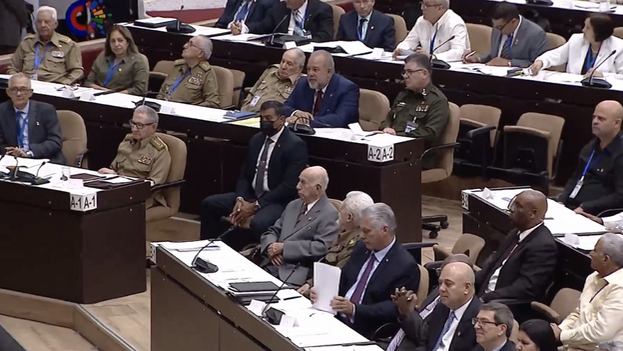
14ymedio, Yoani Sánchez, Generation Y, Havana, 21 April 2023 — The first rays of sunlight this Wednesday bathed Havana’s Carlos III Avenue. Where before there was a constant coming and going of vehicles, the fuel crisis has left a road deserted by cars. The conversations in the long lines focused on lamenting inflation, talking about a relative who managed to emigrate in recent days, or complaining about the power cuts. No one spoke about the parliamentarians who took office on April 19, nor was there speculation about who would be appointed president of the Republic of Cuba.
Hours later, the official media confirmed that Miguel Díaz-Canel was repeating in a second term in the highest post in the nation, while the structure of responsibilities in the National Assembly hardly changed and the cabinet of ministers did not suffer major changes either. Immobility was the pattern that defined an electoral process that hardly generated enthusiasm among citizens, more interested in finding food or managing to travel from one point to another than in following on national television the boring spectacle of a Parliament without any political diversity.
The appointment, for a second term, of the electronic engineer Díaz-Canel sends a message of continuity about the current Cuban model. A message to be read not only by the international community but, especially, by those on the Island who have been asking for a change of direction and a democratic opening for some time. The ruler, who appeared before the national television cameras during the popular protests on July 11, 2021, saying that “the order to combat” had been given, now has five more years to impose the will of his side.
His re-election will be read by many Cubans as confirmation that there will be no economic improvement in the short term and that packing up to emigrate is the wisest decision.
His re-election will be read by many Cubans as confirmation that there will be no economic improvement in the short term and that packing up to emigrate is the wisest decision. Others will conclude that there are more months of tense diplomatic rhetoric to come and that Cuba will continue to be aligned with the axis of authoritarian regimes such as those of Nicaragua, Venezuela and Russia.
Díaz-Canel also represents the tepidness in the necessary economic transformations and the excessive investments in the construction of hotels, while resources for Public Health and Education continue to be cut. His name is also inextricably linked to the more than a thousand political prisoners and the forced exile of hundreds of activists.
Why would someone with so little popularity and a history of so many unfortunate decisions have another five years at the helm of the nation? The designating hand of Raúl Castro has once again put him in that position, selecting him from among the other youngest children to watch his back, to avoid the collapse of the system and to prevent the nonagenarian general and his relatives from ending up in court or having to pack their suitcases to take refuge in the shadow of some foreign comrade.
Díaz-Canel has complied with the order that Castro gave him. He has not managed to offer a more dignified life to Cubans, but he has saved the neck of an entire clan. That is why he has been hand-picked as president again: to delay as long as possible the arrival of freedom in Cuba.
________________________
Editor’s Note: This article was originally published on Deutsche Welle in Spanish.
____________
COLLABORATE WITH OUR WORK: The 14ymedio team is committed to practicing serious journalism that reflects Cuba’s reality in all its depth. Thank you for joining us on this long journey. We invite you to continue supporting us by becoming a member of 14ymedio now. Together we can continue transforming journalism in Cuba.
